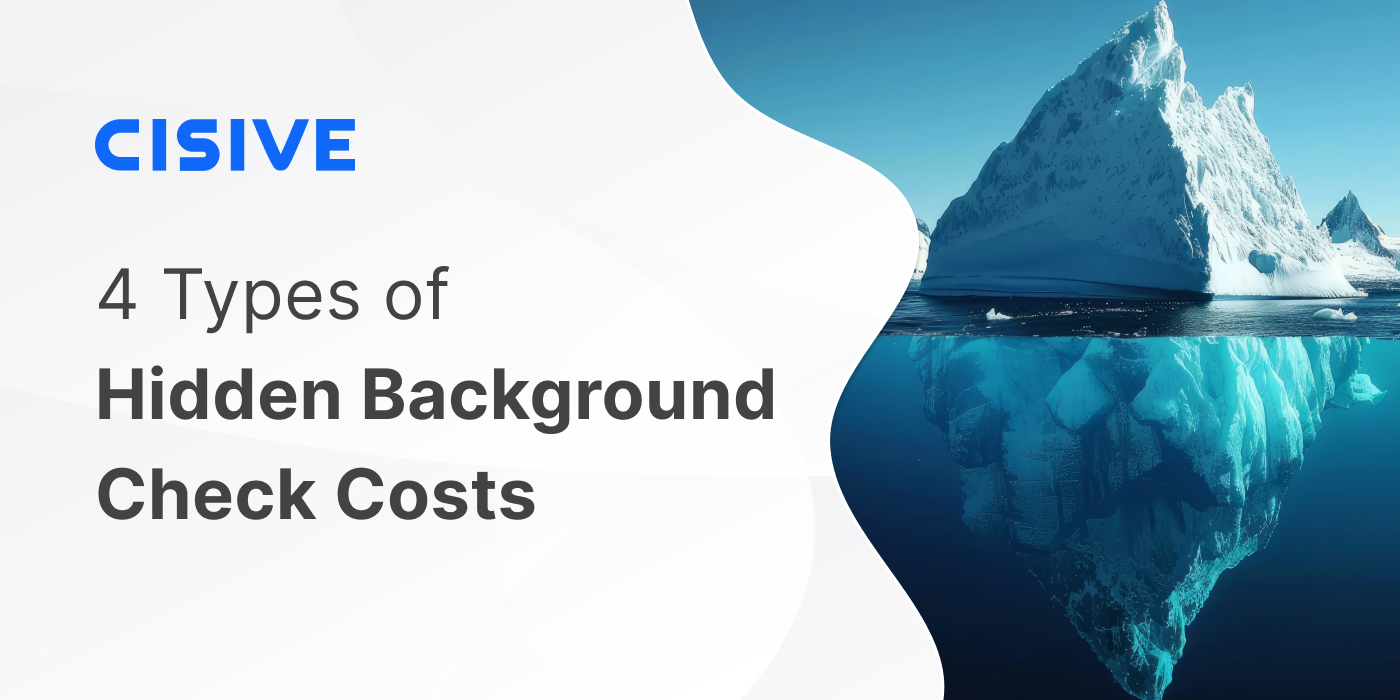

Enterprise organizations are often required to respond to changes in workforce and business...

Overlooking the true costs of background checks can have serious consequences for your organization. For HR leaders, failing to recognize the hidden expenses can lead to significant financial strain, inefficiencies in the hiring process, and even damage to your employer brand. Understanding these hidden costs is crucial for maintaining a smooth, cost-effective hiring process and attracting top talent.
Let’s dive into the often-overlooked complexities of background check costs to make sure you’re fully informed to make the best decisions for your team and budget.
When evaluating background screening vendors, it’s essential to differentiate between true costs and published costs. Published costs are the initial prices quoted by vendors for their services. In contrast, true costs include all the costs that were incurred, including hidden costs like using internal resources, fixing errors, and delays.
Many vendors calculate their cost based on the time it takes to run the background check, but speed isn’t the most important factor to consider. The vendor’s thoroughness, accuracy, and efficiency greatly affect how useful and effective background checks are.

When it comes to background screening, the price per check that vendors advertise is often just the tip of the iceberg. Here are some unexpected background check costs you need to consider.
When evaluating the actual cost of a background screening, it’s crucial to account for different types of background check charges that may not be immediately visible. These can include:
Many background screening vendors use a “three and out” process. “You’re going to have a considerable percentage of verifications that are incomplete or inaccurate,” says Patrick Espie, enterprise sales director at PreCheck. “Behind the scenes, there are costs to having your highly compensated HR professionals doing this work to backfill the incomplete or inaccurate verification.”
This can significantly drive up the cost of what initially seemed like an affordable service. Incomplete or insufficient background checks can expose your organization to negligent hiring risks, potentially leading to costly legal issues.
Delays caused by slow or inefficient background checks can result in lost productivity and revenue. This can lead to increased costs, particularly if the hiring process is prolonged. A slow onboarding process not only affects your team’s efficiency but can also impact your bottom line.
Additionally, if your provider doesn’t use criminal adjudication matrices to outline your hiring criteria, it may result in longer screening times and higher, unnecessary costs.
A cumbersome or frustrating background screening process can damage your employer brand, making it harder to attract top talent. Job candidates may choose to withdraw their applications if they experience delays or issues, leading to increased recruitment costs.
To accurately determine the true cost per completed verification, consider both accuracy and completion rates. For example, a vendor offering low prices might offload verification processes to offshore teams, resulting in lower accuracy and higher completion times. It’s crucial to factor these aspects into your cost calculations.
An advertised price might look appealing, for example, but if the vendor conducts limited criminal record searches or offshores part of the process, the initial savings could be offset by the hidden costs of inaccuracies and delays.

Identifying and addressing potential cost overruns in background screening can help you streamline your operations and avoid unexpected expenses. Here’s how you can uncover these hidden costs and take control of your screening budget.
Speak directly with your HR team members and hiring managers who interact with the screening process. Their insights can reveal inefficiencies or pain points that might not be immediately apparent from a purely financial perspective.
Look at your invoices carefully to uncover any hidden fees. “We can actually look at what they are doing with their current provider,” Patrick says. “Compare the price of that, and we see all sorts of things.” Sometimes, the true costs are buried in fine print or appear as additional charges that weren’t part of the initial quote.
Use tools designed to help analyze the cost implications of your current program. These can provide a detailed breakdown of your expenses and highlight areas where costs can be reduced.
When choosing a new background screening vendor, transparency and alignment with your organization’s goals are paramount. Here are some key questions to ask potential vendors:
“These are just some of the questions that impact the quality and output from your background vendor,” Patrick says. Additionally, consider the value of vendor partnerships, such as integrations with your existing HR systems. Seamless integrations can save time and reduce the likelihood of errors, further lowering your overall costs
Understanding the true costs of background checks goes beyond looking at advertised prices. By taking a strategic, data-driven approach, you can uncover hidden costs, evaluate your current program’s efficiency, and select a vendor that meets your needs. This approach not only ensures cost-effectiveness but also enhances your overall hiring process.
Take the time to analyze your background screening program thoroughly, ask the right questions, and make informed decisions to support your organization’s growth and success. For further insights and personalized advice, consider consulting with experts who specialize in background screening.
Want to learn more? Schedule a call with one of our background screening experts.
Author: Jenni Gallaway
Bio: Content Marketing Manager at Cisive. 8 years of experience in the background screening industry.
Let's Connect on LinkedIn
Enterprise organizations are often required to respond to changes in workforce and business...

In this Cisive Product Highlight series, we’ll review key tools to consider when screening your...

In this Cisive Product Highlight series, we’ll review key tools to consider when screening your...